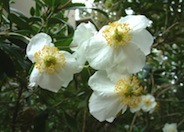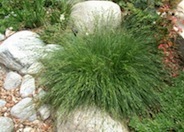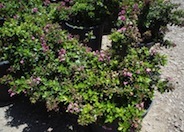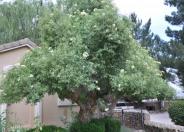
Common name:Bush Anemone
Botanical name:Carpenteria californica
This California native is a dense, clean evergreen shrub that grows 4-8 ft high and 5 ft. wide. It is tolerant of sun or shade. It has white fragrant flowers from May - August.
-Cornflower Farms

Common name:Coral Bells
Botanical name:Heuchera sanguinea
Tufts of round leaves 2-3" wide with scalloped edges accent this plant. It also produces wiry stems to 24" tall with open clusters of red/pink, bell-shaped flowers.

Common name:California Meadow Sedge
Botanical name:Carex pansa
This native Carex can be successfully used as a lawn substitute but requires significant water to obtain good coverage. Once coverage is reached, water can be reduced and maintenance is close to zero. Unmowed, the plant can be used effectively in a variety of conditions and will reach a height of 6" or under and spreads by rhizomes eventually to 2' +.

Common name:Dwarf Escallonia
Botanical name:Escallonia 'Newport Dwarf'
Escallonia 'Newport Dwarf'' is an evergreen shrub with glossy leaves. Grows 2.5 ft. tall and 4 ft. wide, with deep pink to red flowers in summer and fall.

Common name:Blue Elderberry
Botanical name:Sambucus mexicana
The blue elderberry is a deciduous shrub that grows 4-10 ft. tall or tree that reaches up to 40 ft. high. The leaves of this plant have 5-9 leaflets with white spring flower clusters developing into blue berries. The blue elderberry is a native to California, is drought tolerant and is a beneficial insect plant.
-Cornflower Farms

Common name:Western Redbud
Botanical name:Cercis occidentalis
This deciduous shrub ranges from 6-20 ft. tall and 10-15 ft. wide. It is desirable for its magenta spring flowers, yellow to red fall color, and dangling winter seed pods. It is tolerant of many soil types, drought and oak root fungus. It attracts hummingbirds and butterflies. The Western Redbud can be found statewide in California in the foothills below 4500 ft. elevations in chaparral and woodland communities
- Cornflower Farms
Healthy soil is the cornerstone of a vibrant landscape. It provides oxygen and nutrients vital to plant growth and sustenance. It provides protection from the sun and stability for root systems.
Click in the green box for more information
Designer: Agi Kehoe
Photographer: GardenSoft
Maintain a two to four inch layer of mulch on the soil surface to reduce weeds, infiltrate rain water, and reduce compaction.
Attract, or buy beneficial insects such as ladybugs and lacewings to control pest outbreaks in your garden.